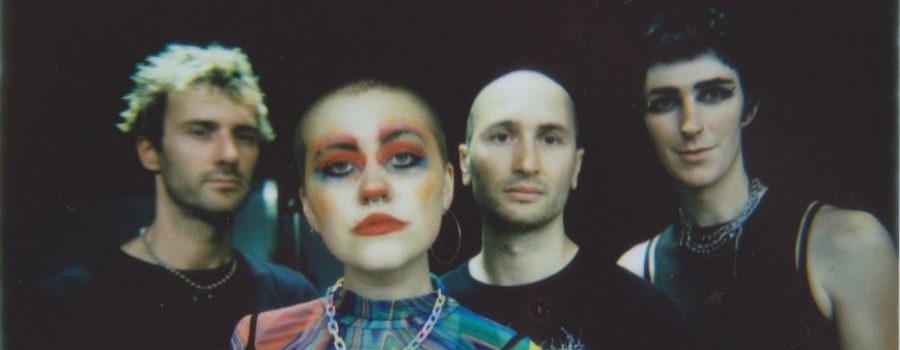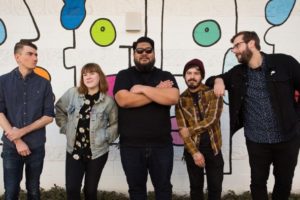When I was growing up music felt very much like candy in a clear bag. We knew exactly what we were going to get before we even pushed play. Today, bands like Secret Shame and so many others have given us the brown paper grab bag era of music because they are putting so much into what they do. Genre ceases to exist and all one is left with is the emotion and lyricism. Some of which I fell enamored with because I could relate wholeheartedly to it. We talked about that connection, what led to the sort of extinction of genres, and more like Secret Shame’s October 28th release, ‘Autonomy.’
Kendra: Asheville is notorious for being a creative mecca of sorts. Do you often feel that vibe when it comes to what you all do in Secret Shame?
Matthew: I think Asheville is big enough to sustain a solid music scene but small enough for a lot of cross-pollination between milieus/genres in a way that helps people feed off one another.
Kendra: When it comes to genre, you’re not alone in not wanting to limit yourself and be inside of a box. I feel like that’s something very much the norm with today’s artists. Do you think that has anything in part to do with the sort of downfall of physical record stores? You know, losing those visible genre sections?
Lena: I think in part, yeah it has to do with record stores not being as prominent. The internet has made it much easier now for people in general–and specifically artists–to find things that inspire them, and styles they want to emulate. But I think what it mostly has to do with is boredom, both in artists and listeners.
A lot of people think they’ve heard it all at this point, and it’s hard to convince them otherwise. Like, say you’re in a classic rock band–what’s setting your band aside from all the other classic rock bands on earth? You could record an incredible album and people say, “Oh great, a Led Zeppelin rip-off. Don’t care.” But if your band is classic rock and your influences include Xiu Xiu, Rihanna, and Sturgill Simpson, it’s probably going to attract people because it’s more fun and interesting for you and it shows. I think more artists are pushing themselves to defy the limits of music and just do whatever makes them feel good instead of whatever’s “marketable.” It’s honestly great.
Matthew: As soon as a genre gets defined it’s essentially dead. Maybe people need to label themselves as “we’re A or we’re B” to market it but thinking too much about genre creates limits and leads to a lot of boring gate-keepy conversations.
Kendra: Now it’s time to talk more about your sophomore album, ‘Autonomy,’ out on October 28th. It’s been a few years since ‘Dark Synthetics,’ and a lot has gone on on both a micro and macro level. What do you feel inspired this new record more – your personal lives or the collective trauma we sort of all have been in together for the past couple of years?
Lena: It’s a personal album for sure. I don’t discount that collective trauma had a role to play; I did write most of the lyrics during lockdown. But ‘Autonomy’ is more about specific moments that people I love and I have experienced, and also about my personal struggles with mental illness.
Kendra: When I read “Luxury Bitch” I think, this is possibly a rap song or some new pop song. Instead, it’s this deep alternative rock track that captures a common fear and that’s losing the one we find the most sort of solace in. For you, other than writing about it – how did you get over that loss?
Lena: Well I wrote the lyrics to “Luxury” in 2020, and at that time it was just a big fear. It wasn’t until a few months ago that it actually happened. I would say it’s still very much a fresh wound, and I’m not over it, but it gets easier as time passes. I also want to clarify that this person I’m talking about is still very close to me, is not dead or anything and we have a great friendship. I’m just melodramatic and I got dumped and it sucked.
“Luxury Bitch” is the song I wrote when I was feeling insecure about how crazy I am and figured nobody would stick around for it. I named it “Luxury Bitch” because I was making fun of myself for perpetuating my own problems and in turn pushing people away. Who knows, maybe I spent so much time dwelling on it that I made it happen!!
Kendra: This record also dives into something I battle with and that’s body dysmorphia, so thank you for that. We get all of these self-love songs and whatnot but rarely do we hear artists talking about the actual reasons we need that self-love. Has there ever been a record or artist that’s given you that sort of feeling like, damn – maybe I’m not alone in what I’m feeling whether it be physical or mentally?
Lena: I’m glad and also sorry to hear that it’s relatable to you, and I hope this record reaches you in a way that helps.
I tend to listen to music that makes me think, “wow, these people are crazy.” My favorite band growing up was the Pixies, and I loved how Frank Black and Kim Deal would like, whisper and laugh, and scream in layered vocal tracks behind some catchy chorus melody. I get so excited about artists who are strange and unafraid. And I’ve always more or less leaned towards music with lyrics that felt relatable to me.
But it was when I heard “Ugly” and “Please Eat” by Nicole Dollenganger for the first time that music had ever hit me like that. It was like ohhh, she’s saying exactly what I’m going through, but it’s not even about me, it’s her experience and she’s not holding back at all and millions of people are hearing it. She’s not sugarcoating anything with metaphors. That’s fucking vulnerable. And inspiring. I couldn’t even tell my friends what I was going through at that time, let alone the world. I can’t listen to those songs often, but I’m thankful they exist.
Kendra: Lastly, with ‘Autonomy’ out on October 28th, do you have plans in the works for 2023 as far as touring is concerned?
Lena: Definitely.






